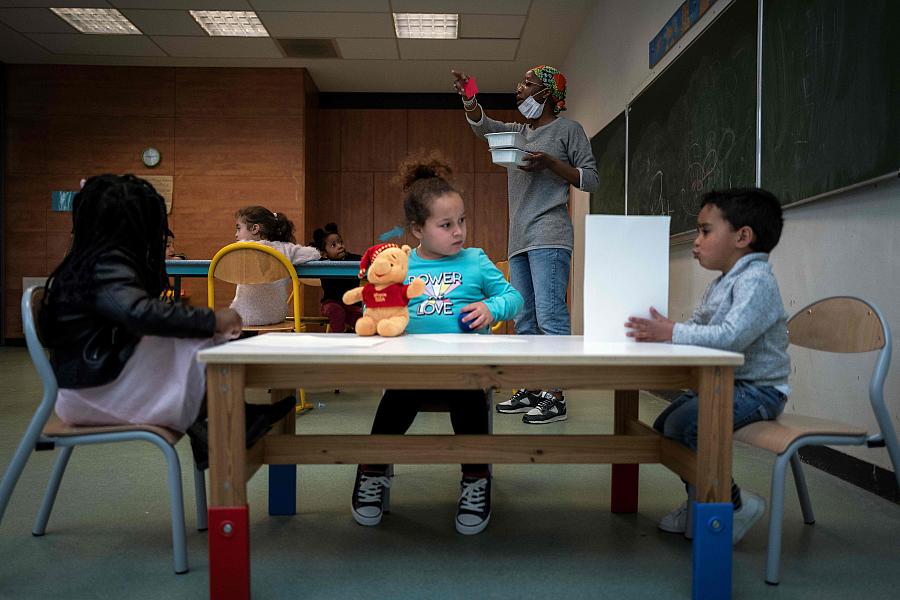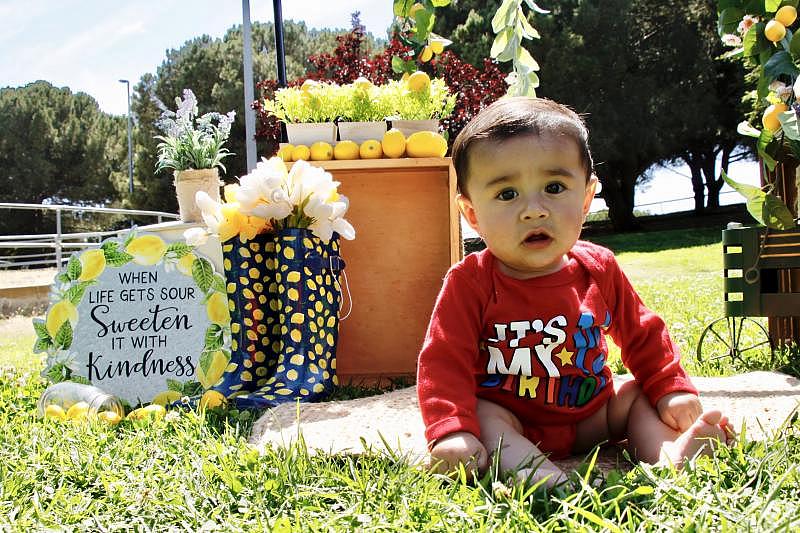My infant son caught COVID-19 at day care

(Photo by Lionel Bonaventure/AFP via Getty Images)
I thought I found the perfect day care four months ago in Harbor City, south of Los Angeles. The owner gave my husband and me a tour of her home, which serves seven to nine children daily. She assured us that she and her two employees were vaccinated for COVID-19. To prevent the spread of the virus, she made sure babies don’t share items. She asked us to bring a swing, a bassinet and a chair for our 3-month-old son.
My baby seemed to enjoy the place, and I felt happy to see him thriving. The morning worker always wore a face mask. My son never cried when I waved good-bye.
Then, when we arrived on July 9, the owner told me my baby couldn’t stay because one of her employees had tested positive for COVID-19. She said she reported the case to the health department and would be closing the day care for three weeks.
I asked how someone who was vaccinated could get infected. She said the employee hadn’t been vaccinated “for personal reasons,” and she couldn’t force her staff to do it.
I felt shocked, disappointed and scared.
I had relied on the owner’s word that her staff was vaccinated. While we can’t go asking people for their vaccine card as proof, it seems to me the honor system doesn’t work.
When I told my husband, his immediate reaction was to get our child tested. At first our health care provider, Kaiser Permanente, didn’t want to test him because he had no symptoms. My husband pushed back and we got the test.
Two days later we received the devastating news that our baby was infected.
My husband and I had taken scrupulous care of ourselves for a year and a half and did everything possible to keep our baby safe. Still, we couldn’t prevent him from getting infected.
I cried. I felt helpless. I imagined the worst.
I knew it was only a matter of time before I got infected. I had received my shot of the Johnson & Johnson vaccine in March. But my son is too young to take care of himself or wear a mask. I stayed in a room with him, and it was impossible for me to sleep with a mask. Soon enough, I too tested positive.
Dr. Ilan Shapiro, medical director of health education and wellness of the health network AltaMed, said the vast majority of minors who contract COVID-19 fully recuperate. But some have died and some have also developed pediatric multisystemic inflammatory syndrome (MIS-C) a serious condition that can affect the heart, lungs, brain and other vital organs. Knowing these complications are rare didn’t make them less terrifying to me.
My child experienced only one night of high fever. But the long-term effects of this virus are still unknown. Researchers in Rome studied 129 children who had been diagnosed with COVID-19 in 2020. More than one-third had one or two symptoms four months or more after infection, and nearly one-quarter had three or more symptoms, including insomnia, fatigue and muscle pain. Even some children who’d gotten only mildly sick when they were infected, or who had been asymptomatic, had lingering effects, the research team reported in April.
Vaccine mandates and child care
Like much of the country, Los Angeles County is seeing a fast rise of infections. The unvaccinated account for the majority of hospitalizations. Even when vaccinated people become infected, they generally don’t become seriously ill — or in many cases, suffer any symptoms. I had a runny nose and sneezing for two or three days and lost my sense of taste and smell for about a week. My husband, who had received the Pfizer vaccine, got a rapid test, which was positive, and four of the more accurate PCR tests, which all were negative.
Being vaccinated lessened our worries at home.
About 4 million people in Los Angeles County, including 1.3 million children under age 12, have not been or are not eligible to be vaccinated.
According to the Los Angels County Department of Public Health, a child care center or home must report a COVID-19 outbreak as soon as possible. Whether or not the center has to close depends on how many people have potentially been exposed.
The author's infant son, Andy. (Photo courtesy Jacqueline Garcia)
Dr. Robert Gilchick, a public health and general preventive medicine specialist in Los Angeles, said a large center with multiple classrooms, where care is taken to keep each class separate, might have to send home only a specific group. The rest of the center can continue to operate while the health department tracks the outbreak.
A small center, like the family day care I used, would likely have to close for the duration of the outbreak, generally about two weeks.
California requires staff and volunteers in child care settings to be vaccinated for measles, whooping cough and flu but not COVID-19 — at least, not yet. Many jurisdictions and employers are waiting for the Food and Drug Administration to approve the vaccine before they make it mandatory. COVID vaccines are still under a special emergency use authorization. The federal Equal Employment Opportunity Commission has said employers don’t have to wait for full FDA approval; they can generally require employees to get vaccinated for COVID as long as they make accommodations consistent with the Americans with Disabilities Act and other disability laws.
And because the COVID vaccines don’t prevent 100% of infections, an employer may require workers to get tested regularly for COVID even if they’ve been vaccinated.
The owner of my son’s day care home assures me she will now require the staff to get vaccinated. I cannot confirm it will happen. We haven’t decided whether we will go back, and I don’t know what the other parents will do.
Until vaccination is required for all who work in day care and rules are enforced, we may face the same situation anyplace we take our children.

